by Jennifer Bearden | Mar 21, 2014
Pesticide Training and Exams being offered at the University of Florida IFAS Okaloosa County Extension Office.
March 31, 2014
8am-11am Aquatic Pesticide Training
11am Aquatic Exam
1pm-4pm Natural Areas Training
4pm Natural Areas Exam
Cost is $10 for Aquatic Training and $10 for Natural Areas Training
To receive a new Aquatic or Natural Areas pesticide license, you must have previously passed the CORE exam.
For more information or to RSVP, Call 850-689-5850 or email bearden@ufl.edu
CEUs applied for.
Aquatic and Natural Areas Training and Exam Flyer
Register and Pay online at https://www.eventbrite.com/e/aquatic-and-natural-areas-pesticide-training-and-exam-tickets-10997613157
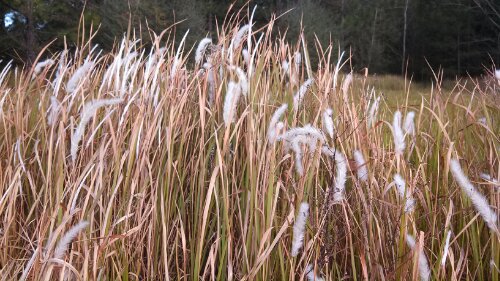
by Jennifer Bearden | Jan 3, 2014

Join us for a workshop on the biology and control of cogongrass.
January 14, 2014
Registration begins at 8:30am (Eastern Time)
Program starts at 9:00am (Eastern Time) and will end at 4:30pm (Eastern Time).
The cost of the workshop is $25 and includes lunch.
Locations:
Pensacola, Fl
Crestview, Fl
Chipley, Fl
Tallahassee, Fl

Please remember to specify which locations when calling to register and purchase the correct location ticket when registering online.
Pesticide CEUs have been requested. We are awaiting final approval and will update this post as soon as we have additional information. If you have questions please contact us at 850-606-5200.
AGENDA
Cogongrass in the Panhandle Workshop
9:00 – 9:50 AM – Overview, Biology and Control of Cogongrass – Dr Greg MacDonald, UF-IFAS Agronomy – Participants will learn what we currently know about the biology and control of cogongrass.
9:50 – 10:40 AM – “Safely Applying Right of Way Herbicides” – Jennifer Bearden & Sheila Dunning, UF-IFAS Extension Okaloosa County – Participants will learn pathways of herbicide efficacy, safety, label-reading, and PPE for common Right of Way Herbicides.
11:00-11:50 AM – Update: “Cogongrass Control in ROW, Forestry and Natural Areas – New Research, New Programs” – Participants will learn herbicide selections, application rates, timing and methods of control being researched and employed in the Southeast.
11:00 – 11:25 AM – “Imazapyr and Glyphosate Application Rate, Timing, and Methods for Cogongrass Control” – Dr Pat Minogue, UF-IFAS/NFREC Forestry
11:25 – 11:50 AM – “USFS/Five-State Forestry Agency Cogongrass Initiative” – Dr Jeff Eickwort, FDACS-Florida Forest Service
11:50 AM – 12:40 PM – “Cooperative Invasive Species Management in the Panhandle”
11:50 – 12:10 – “Breaking down Artificial Barriers to Allow Everyone to Cooperate” –
Brian Pelc, Natural Areas Restoration Specialist with The Nature Conservancy, and Invasive Species Coordinator for the Apalachicola National Forest, USFS
12:10 – 12:25 – A Regional Case Study from the Apalachicola CISMA (Cooperative Invasive Species Management Area) – Brian Pelc, Natural Areas Restoration Specialist with The Nature Conservancy and Invasive Species Coordinator for the Apalachicola National Forest, USFS
12:25 – 12:40 – A Regional Case Study from the Six Rivers CISMA – Brooke Saari, Sea Grant Extension Agent, UF/IFAS Extension in Okaloosa and Walton counties
12:40 – 1:30 PM – Lunch (catered-in at each host site)
1:30 – 2:30 PM – “Tools for Identifying, Tracking and Managing Cogongrass across the Landscape” – Participants will learn to use technologies available to identify, track and manage cogongrass infestations.
1:30 – 2:00 PM – “Monitoring Cogongrass Infestations with EDDMapS” – Jed Dillard, UFIFAS Extension Jefferson County
2:00 – 2:30 PM – “A Local Case Study from the City of Tallahassee”– Tony Murray, Coordinator of Environmental Regulation Compliance with City of Tallahassee Environmental Policy and Energy Resources/ Policy & Program Development
The following topics will be covered by Extension faculty at each site.
Okaloosa – Jennifer Bearden and Sheila Dunning
Washington – Mark Mauldin and Josh Thompson
Leon – Will Sheftall and Stan Rosenthal
Jefferson – Jed Dillard
2:30 – 2:55 PM – Cogongrass and Look-alikes ID – Participants will learn how to identify Cogongrass and some similar plants.
3:00 – 3:25 PM – Label Reading Exercise – Participants will learn to read herbicide labels and why it is important.
3:30 – 3:55 PM – Sprayer Calibration – Participants will learn methods to calibrate ATV and Backpack sprayer equipment.
4:00 – 4:25 PM – Personal Protective Equipment – Participants will learn proper equipment and why it is important.
4:25-4:30 PM – Evaluation
by Brooke Saari | Mar 1, 2013

National Invasive Species Awareness Week
Invasive Species Awareness: How is Your Invader Knowledge?
Invasive species are non-native or exotic species that do not naturally occur in an area and cause economic or environmental harm or harm to human health. These invasive species have become the number one threat to biodiversity on protected lands. However, invasive species do not know boundaries and as a result public and private lands are affected as well as natural and man-made water bodies and associated watersheds. Northwest Florida is home to many unique habitats, including upland, wetland, and marine. These habitats, housing a variety of plants and animals, make this area considered as one of the top six biodiversity hotspots in the country. These invasive species threats can come in the form of both plants and animals, in Florida there are over 500 non-native fish and wildlife species and over 1180 non-native plant species that have been documented. Exotic species are able to outcompete many natives causing habitats to degrade, animals to leave, and can introduce diseases that can destroy economically important species. This is a worldwide issue that can be addressed on local levels. One of the most effective ways to control invasive species is by prevention, just by becoming invasive aware can help to control some of these issues.
So how aware are you? Recreationalists such as boaters, fishermen, pet owners, gardeners, hikers and travelers can be unknowing dispersers of invasive species. These everyday steps can help: By cleaning and draining your boat, gear and trailer between water bodies can stop the spread of species that may be hitchhiking on your equipment. If you are a pet owner and find yourself in a possession of a pet you no longer want or can care for, it is important not to release these into the wild. No pet, either native or exotic, should ever be released. This act can cause more harm than good, not only to your pet but to the other native wildlife. Follow the simple tips on Habitattitude to get tips on alternatives to releasing your pet. When out enjoying nature while biking, hiking, camping, birding, etc. take care to check where you are trekking, what might have attached to your clothing, making sure you do not end up being an unwitting disperser. Gardeners, even you can help especially when dealing with non-native plant dispersal. Not all non-native plants are bad but make sure that the plants you are putting in your garden are not harmful invaders that will make it into natural areas. Verify your plants by making sure they do not occur on the invasive plant list which can be found at http://www.fleppc.org/. There are many ways to get involved in the battle against invasive species. For more information about National Invasive Species Awareness Week (NISAW) please visit http://www.nisaw.org/, landowners can join your local Cooperative Invasive Species Management Areas (CISMA) group or for more info on local invasive species contact your UF/IFAS extension office. Look for the invasive species of the day posts on the Panhandle Outdoors Extension Newsletter blog throughout NISAW to increase your awareness of local invasive exotic species.
For more information, please contact Brooke Saari, Florida Sea Grant Marine Science Agent, Okaloosa/Walton County UF/IFAS Extension by phone 689-5850 or email bsaari@ufl.edu.
by Carrie Stevenson | Mar 1, 2013
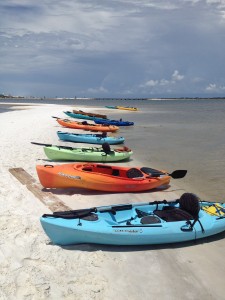 Are you interested in exploring and discovering more about the waterways and wildlife around you? If so, Panhandle Outdoors LIVE may be right up your alley. In 2012, natural resources Extension Agents took over 200 people on trips from Perdido to Apalachicola, and this yearlong series of hiking, boating, and kayaking trips is back by popular demand with 9 new locations. Local experts will provide you with insight into the “real” Florida and take you to places unique to our corner of the world. We promise you’ll go home with a new appreciation for our Florida ecosystems!
Are you interested in exploring and discovering more about the waterways and wildlife around you? If so, Panhandle Outdoors LIVE may be right up your alley. In 2012, natural resources Extension Agents took over 200 people on trips from Perdido to Apalachicola, and this yearlong series of hiking, boating, and kayaking trips is back by popular demand with 9 new locations. Local experts will provide you with insight into the “real” Florida and take you to places unique to our corner of the world. We promise you’ll go home with a new appreciation for our Florida ecosystems!
The expedition schedule is as follows:
March 15: Aucilla River Sinks (Jefferson County)
March 28: The Great Florida Wildlife Trail (Calhoun County)
April 2: Pitcher Plants & Weeks Bay (Baldwin County, Alabama)
May 8: Coastal Dune Lakes (Walton County, Florida)
June 6: Yellow River & Boiling Creek (Santa Rosa County)
August 15: Saltwater Marshes of St. Andrews Bay (Bay County)
September 24: Apalachicola National Estuarine Research Reserve (Franklin County)
October 3: Blackwater River State Forest (Santa Rosa County)
November 15: Seagrasses & Manatees of Apalachee Bay (Wakulla County)
Each day starts at 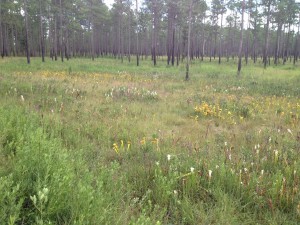 9:30 am central/10:30 am eastern and runs to 4:00 central/5:00 eastern. Please arrive at least 20 minutes early for each trip to ensure the events can start on time. Depending on location, moderate walking, hiking, swimming, and/or paddling may be involved. Lunch, park entry fees, and rentals will be provided for each participant (18 and up only) at a cost of $30.
9:30 am central/10:30 am eastern and runs to 4:00 central/5:00 eastern. Please arrive at least 20 minutes early for each trip to ensure the events can start on time. Depending on location, moderate walking, hiking, swimming, and/or paddling may be involved. Lunch, park entry fees, and rentals will be provided for each participant (18 and up only) at a cost of $30.
Click here for registration and contact information. Space is limited, so register early!
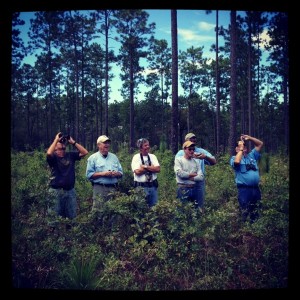
Enjoy exploring Northwest Florida during Panhandle Outdoor Live 2013
Necessary equipment and clothing will vary based on weather and location, but participants should bring sturdy shoes, drinking water, sunscreen, and a camera to each trip. Transportation to each location will be facilitated by carpooling, and some counties may be able to provide transportation.
by Scott Jackson | Feb 28, 2013
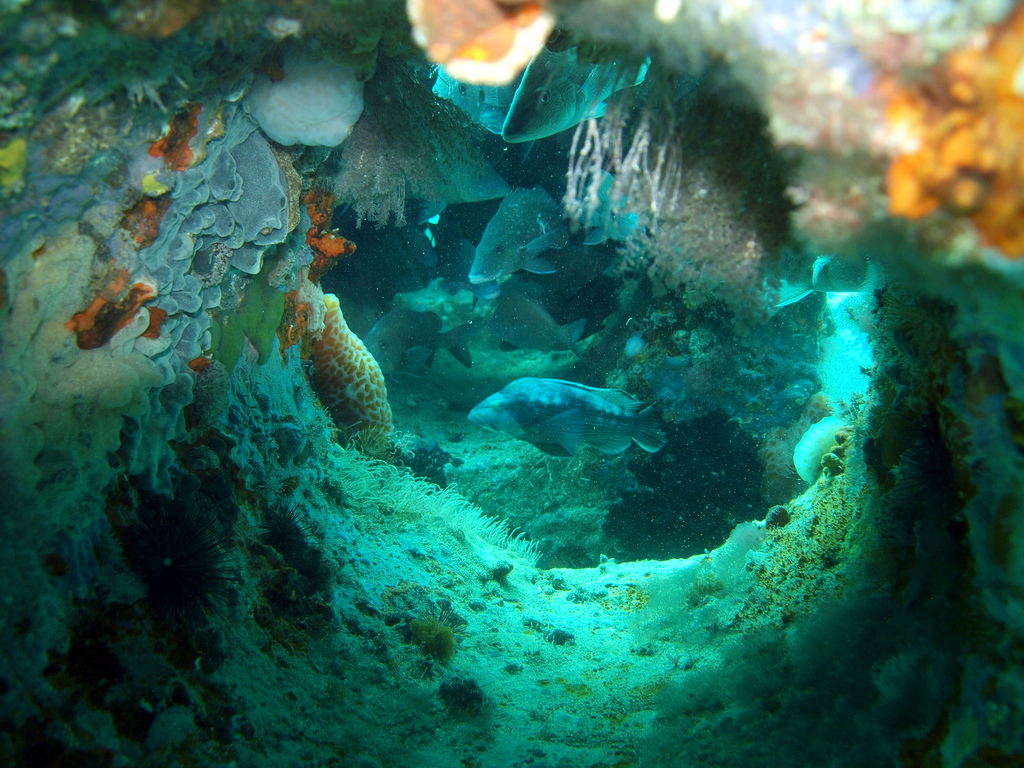
Fish swimming in cube reef located near Taylor County, Florida.

One of the highlights from last week’s Northwest Florida Artificial Reef Workshop was the panel discussion which included Bill Lindberg, Bob Shipp, Will Patterson, and Luiz Barbieri. These researchers provided information regarding the current state of reef fisheries in the Gulf. Additionally, they suggested strategies for use of artificial reefs. Please view the session recording by clicking here.
by Carrie Stevenson | Jan 3, 2013
It is human nature to explore. We are a curious species, yearning from birth to stimulate our senses of sight, smell, touch…from an infant’s grab at a colorful toy to an astronaut setting foot on the moon, we thrive on new adventures and understanding. A legend of the Age of Exploration, Spanish explorer Ponce de Leon set foot on Florida’s coast in 1513, and 500 years later, another water-based expedition is taking place. This time, the explorer sets out not to conquer, but to celebrate the unique ecology and history of Florida. On January 1, University of Florida graduate Justin Riney, founder of a nonprofit advocacy group called Mother Ocean, launched a 365 day standup paddleboard journey around the state. Several standup paddleboarding enthusiasts (myself included) joined him at Big Lagoon State Park in Pensacola to begin the 1,515 mile Florida Circumnavigational Saltwater Paddling Trail, which hugs the coastline south through the Keys and back north to Jacksonville.
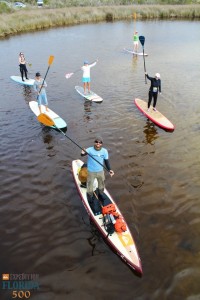
The author (top right) participates in the launch of Expedition Florida 500 at Big Lagoon State Park on January 1. Photo Credit: Jackson Berger
Justin plans to paddle for at least 10 miles a day, carrying all of his gear on his board and camping at beaches in each community. The goal of the trip is not only to help celebrate the 500th anniversary, but he’s partnered with the Florida Department of Environmental Protection, the University of Florida, and several watersports companies to promote the expedition and highlight conservation of the springs, rivers, estuaries and beaches around our state. He hopes the journey will inspire people to explore and protect our invaluable water resources, and encourages locals to join him at each location to paddle and share knowledge about their waterways. Along the route, he has scheduled almost three weeks to take daylong tours in areas of particular ecological and historical significance. Today several of us joined him on a trip through Pensacola Bay, where we discussed everything from the history of Fort Pickens, to the improvement of water quality in Bayou Chico, to the Appalachian origins of our sugar-white sands.
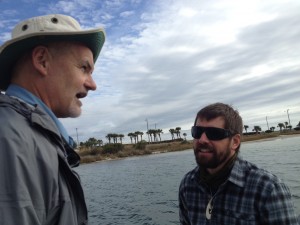
Captain Robert Turpin, Escambia County Marine Resources (left), discusses seagrass preservation in Little Sabine Bay with Justin Riney.
In several communities, he plans to lead coastal cleanups. Justin will be paddling from Pensacola through Gulf Breeze tomorrow and to south Okaloosa and Walton counties through January 11. From there, he will continue along the coast, and on to Bay and Franklin counties between the 15-26 of this month. The detailed schedule below outlines his route from the Panhandle and beyond.
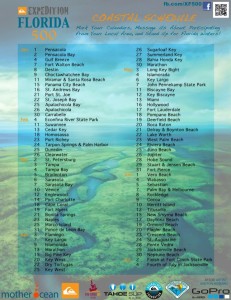
Coastal Schedule for Expedition Florida 500
You can follow Justin’s experiences at Expedition Florida 500 on Facebook to see updates, photos, and information about where he will be next. If you’re a standup paddleboarder, kayaker, or just interested in the project, contact him through the page and take the time to be part of this historic journey. And for those of you who live further inland, after reaching Jacksonville on July 4, he plans to paddle back through the state exploring inland waterways–rivers, springs, and lakes–so there’s a good chance Expedition Florida will come to your community this year as well!











